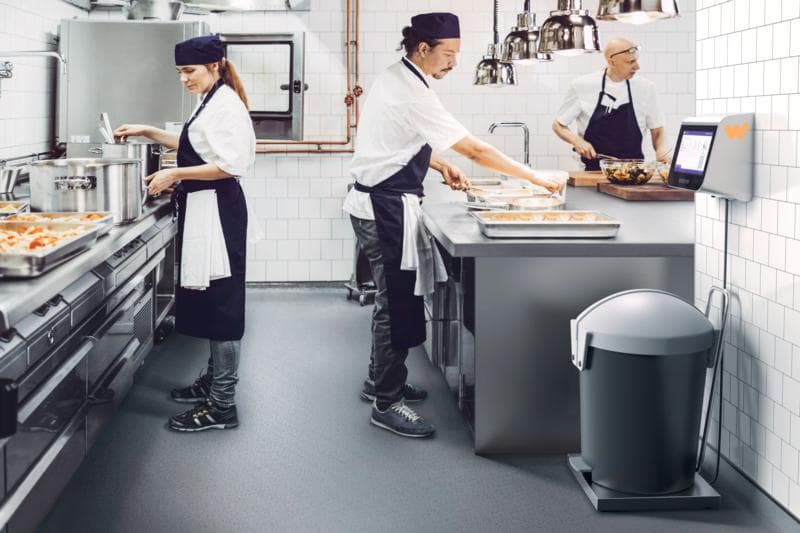2024-09-23
Guckenheimer Becomes First Major U.S. Food Services Provider to Cut Food Waste in Half
Guckenheimer achieved a 64% reduction in food waste, surpassing its goal of reducing food waste by 50% by the end of 2024. Its food waste reduction efforts, supported by Winnow’s AI technology, have saved an estimated 983,000 meals from the trash each year and avoided 1,500 metric tons of CO2e emissions.

Guckenheimer, leading U.S.-based food services provider, announced today that it has achieved a 64% reduction from Q2 2022 baseline data, well surpassing its ambitious goal set in 2021 of reducing food waste by 50% by the end of 2024. This milestone positions Guckenheimer as the first major U.S. food service business to cut food waste in half, setting a new industry benchmark.
The achievement is a testament to Guckenheimer’s commitment to environmental stewardship, which the company emphasized as a core value in its recent brand refresh. It also aligns with the global goal of Guckenheimer’s parent company, ISS, to halve food waste by 2027 and supports the achievement of the United Nations’ Sustainable Development Goal (SDG) 12.3, which aims to halve global food waste by 2030.
"We are incredibly proud to have surpassed our food waste reduction goal by a wide margin," said Paul Fairhead, CEO of Guckenheimer. "This accomplishment underscores the value we deliver to our clients and communities from an environmental and sustainability perspective and also accentuates our commitment to championing environmental responsibility and leading the industry in doing so. By preventing 983,000 meals from reaching landfills each year, we are contributing to a more sustainable future for all."
To help drive its ambitious food waste reduction goals, Guckenheimer harnessed the power of vendor and client relationships—none more impactful that its partnership with Winnow, which provides the company with cutting-edge AI food waste measurement solutions. Winnow’s tools have empowered Guckenheimer teams across North America to make data-driven decisions that enhance operational efficiency and deliver substantial environmental benefits.
The UN’s latest Food Waste Index Report estimates that over 1 billion tons of food went to waste in 2022, highlighting the critical global issue. The food service sector alone accounts for 28% (290 million tons) of this waste. In the United States, the value of surplus food generated by the food service industry was estimated at $138 billion in 2022 (Source: ReFED).
“I am delighted to see Guckenheimer’s commitment to tackling the global challenge of food waste,” said Dr. Liz Goodwin OBE, Senior Fellow, Food Loss and Waste, World Resources Institute. “There is increasing recognition of the importance of reducing global food loss and waste – and the potential to reduce global greenhouse gas emissions and other environmental pressures as well as deliver economic and social benefits. The organization is to be congratulated for the progress made so far and the fact it has surpassed its 50% food waste reduction goal.”
"Our clients remain keenly interested in elevating environmentally responsible practices, and partnering with Winnow has been transformative for our ability to meet that need," said Paul Fairhead. "The AI tools have not only helped us reach our waste reduction goal but have also provided us with invaluable insights to drive continuous improvement."
Marc Zornes, CEO and Founder of Winnow, added, "The achievements by Guckenheimer and ISS are a powerful demonstration of the impact that technology can have in reducing food waste. We are honored to support their journey and look forward to seeing the continued success of their sustainability initiatives."
As the food service industry continues to grapple with the challenges of food waste, Guckenheimer’s leadership in sustainability and its commitment to waste reduction set a powerful example for others to follow.
How Guckenheimer uses Winnow’s AI tools
Guckenheimer equips hundreds of kitchens it operates with Winnow technology, allowing its staff to track occurrences and trends in food waste within their production stream and ultimately empowering them to adopt practices that significantly reduce waste.
Designed to require minimal interaction, Winnow’s flagship “Vision” system consists of a motion-sensor camera, smart-scale and tablet. The technology utilizes computer vision trained on a database of over 327,000,000 images of food waste to automatically identify over 1,000 food items as they are thrown away. The weight and cost of the waste is then instantly calculated and displayed to the user.
All captured data is uploaded to the cloud, where food waste from each day is recorded and analyzed. With access to daily, weekly, and monthly reports, Guckenheimer kitchens receive the necessary information to drive operational efficiencies, change behaviors, and innovate techniques in preparation, cooking and plating.
The result is a win-win: using AI in its kitchens allows Guckenheimer to drive efficiencies alongside significant reductions in environmental impact and costs.
Food savings data at Guckenheimer
- Guckenheimer's goal was to reduce food waste by 50% by 2024, which—with a 64% reduction—it surpassed by a wide margin.
- Guckenheimer also had a halfway goal of reducing food waste by 25% by the end of 2022, which it achieved.
- Guckenheimer and Winnow’s reduction calculation methodology uses Q2 2022 food waste data as a baseline for reduction measurement. The Q2 2022 baseline is a weighted average across the Guckenheimer portfolio including the majority of accounts using Winnow and accounts tracking food waste in other ways. Data from Q2 2024 was then measured against Q2 2022 baseline data, reflecting a 64% reduction achievement.
- ISS recently announced that it is on track to meet its global ambition to reduce food waste by 50% by 2027.
- Across North America, Guckenheimer is saving up to 983,000 meals and preventing 1,500 metric tons of CO2e emissions each year. This is a conservative figure calculated using a blend of FAO and WRAP estimates for the CO2e emissions associated with food waste.
- In reducing waste Guckenheimer is saving over $1 million in food costs each year, with savings reinvested in their product offering.
For media inquiries:
Peter Mikol, Head of Communications, North America, 210-214-2161